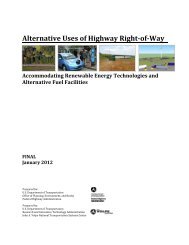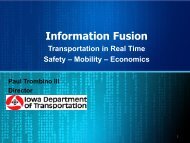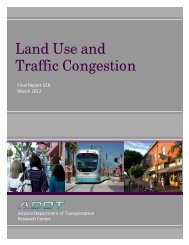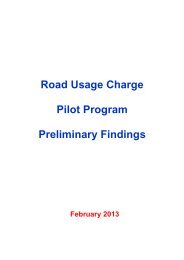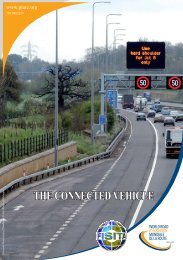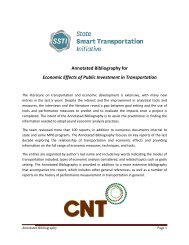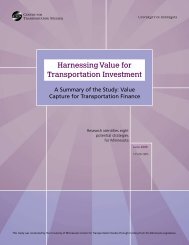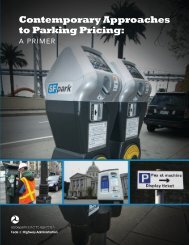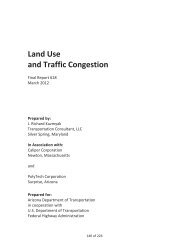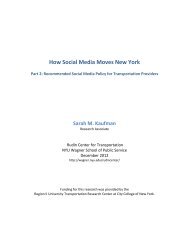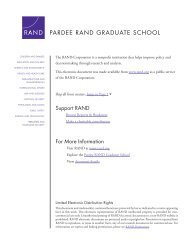- Page 1 and 2:
SHRP 2 Reliability Project L11 Eval
- Page 3 and 4:
The National Academy of Sciences is
- Page 5 and 6:
SHRP 2 L11: Final Report TABLE OF C
- Page 7 and 8:
SHRP 2 L11: Final Report ALTERNATIV
- Page 9 and 10:
SHRP 2 L11: Final Report LIST OF FI
- Page 11 and 12:
SHRP 2 L11: Final Report LIST OF AP
- Page 13 and 14:
SHRP 2 L11: Final Report ABSTRACT T
- Page 15 and 16:
SHRP 2 L11: Final Report well as to
- Page 17 and 18:
SHRP 2 L11: Final Report Improved t
- Page 19 and 20:
SHRP 2 L11: Final Report travel tim
- Page 21 and 22:
SHRP 2 L11: Final Report • Develo
- Page 23 and 24:
SHRP 2 L11: Final Report That same
- Page 25 and 26:
SHRP 2 L11: Final Report Figure 1.1
- Page 27 and 28:
SHRP 2 L11: Final Report • Mode (
- Page 29 and 30:
SHRP 2 L11: Final Report Group Numb
- Page 31 and 32:
SHRP 2 L11: Final Report different
- Page 33 and 34:
SHRP 2 L11: Final Report • Infreq
- Page 35 and 36:
SHRP 2 L11: Final Report REFERENCES
- Page 37 and 38:
SHRP 2 L11: Final Report • Number
- Page 39 and 40:
SHRP 2 L11: Final Report Operationa
- Page 41 and 42:
SHRP 2 L11: Final Report REFERENCES
- Page 43 and 44:
SHRP 2 L11: Final Report changing t
- Page 45 and 46:
SHRP 2 L11: Final Report near-real-
- Page 47 and 48:
SHRP 2 L11: Final Report Considerab
- Page 49 and 50:
SHRP 2 L11: Final Report penalties
- Page 51 and 52:
SHRP 2 L11: Final Report trucks det
- Page 53 and 54:
SHRP 2 L11: Final Report amount of
- Page 55 and 56:
SHRP 2 L11: Final Report • The pe
- Page 57 and 58:
SHRP 2 L11: Final Report order to m
- Page 59 and 60:
SHRP 2 L11: Final Report REFERENCES
- Page 61 and 62:
SHRP 2 L11: Final Report United Sta
- Page 63 and 64:
SHRP 2 L11: Final Report • Higher
- Page 65 and 66:
SHRP 2 L11: Final Report a high vol
- Page 67 and 68:
SHRP 2 L11: Final Report REFERENCES
- Page 69 and 70:
SHRP 2 L11: Final Report Freight 23
- Page 71 and 72:
SHRP 2 L11: Final Report 45. Safiro
- Page 73 and 74:
SHRP 2 L11: Final Report 5. ALTERNA
- Page 75 and 76:
SHRP 2 L11: Final Report communicat
- Page 77 and 78:
SHRP 2 L11: Final Report transporta
- Page 79 and 80:
SHRP 2 L11: Final Report Congestion
- Page 81 and 82:
SHRP 2 L11: Final Report Scenario D
- Page 83 and 84:
SHRP 2 L11: Final Report Finance
- Page 85 and 86:
SHRP 2 L11: Final Report 6. OPERATI
- Page 87 and 88:
SHRP 2 L11: Final Report • Infras
- Page 89 and 90:
SHRP 2 L11: Final Report Informatio
- Page 91 and 92: SHRP 2 L11: Final Report Table 6.2
- Page 93 and 94: SHRP 2 L11: Final Report Table 6.3
- Page 95 and 96: SHRP 2 L11: Final Report Table 6.4
- Page 97 and 98: SHRP 2 L11: Final Report Infrastruc
- Page 99 and 100: SHRP 2 L11: Final Report Table 6.6
- Page 101 and 102: SHRP 2 L11: Final Report STRATEGIES
- Page 103 and 104: SHRP 2 L11: Final Report Service Pa
- Page 105 and 106: SHRP 2 L11: Final Report Table 6.8
- Page 107 and 108: SHRP 2 L11: Final Report Congestion
- Page 109 and 110: SHRP 2 L11: Final Report Driver Qua
- Page 111 and 112: SHRP 2 L11: Final Report the applic
- Page 113 and 114: SHRP 2 L11: Final Report • Dynami
- Page 115 and 116: SHRP 2 L11: Final Report Home tran
- Page 117 and 118: SHRP 2 L11: Final Report have signi
- Page 119 and 120: SHRP 2 L11: Final Report Table 6.14
- Page 121 and 122: SHRP 2 L11: Final Report 17. Levins
- Page 123 and 124: SHRP 2 L11: Final Report demand and
- Page 125 and 126: SHRP 2 L11: Final Report • Limite
- Page 127 and 128: SHRP 2 L11: Final Report • All ne
- Page 129 and 130: SHRP 2 L11: Final Report be fast en
- Page 131 and 132: SHRP 2 L11: Final Report congestion
- Page 133 and 134: SHRP 2 L11: Final Report developmen
- Page 135 and 136: SHRP 2 L11: Final Report Table 7.2
- Page 137 and 138: SHRP 2 L11: Final Report Institutio
- Page 139 and 140: SHRP 2 L11: Final Report the value
- Page 141: SHRP 2 L11: Final Report considerat
- Page 145 and 146: SHRP 2 L11: Final Report • adjust
- Page 147 and 148: SHRP 2 L11: Final Report to Giovann
- Page 149 and 150: SHRP 2 L11: Final Report • an inc
- Page 151 and 152: SHRP 2 L11: Final Report Technical/
- Page 153 and 154: SHRP 2 L11: Final Report Table 7.3
- Page 155 and 156: SHRP 2 L11: Final Report CONCLUSION
- Page 157 and 158: L11 Copy ____ Evaluating Alternativ
- Page 159 and 160: SHRP 2 L11: Final Appendices APPEND
- Page 161 and 162: SHRP 2 L11: Final Appendices The fo
- Page 163 and 164: SHRP 2 L11: Final Appendices • Ut
- Page 165 and 166: SHRP 2 L11: Final Appendices o Ramp
- Page 167 and 168: SHRP 2 L11: Final Appendices Determ
- Page 169 and 170: SHRP 2 L11: Final Appendices the de
- Page 171 and 172: SHRP 2 L11: Final Appendices Basica
- Page 173 and 174: SHRP 2 L11: Final Appendices effect
- Page 175 and 176: SHRP 2 L11: Final Appendices Equati
- Page 177 and 178: SHRP 2 L11: Final Appendices Table
- Page 179 and 180: SHRP 2 L11: Final Appendices Figure
- Page 181 and 182: SHRP 2 L11: Final Appendices from a
- Page 183 and 184: SHRP 2 L11: Final Appendices most s
- Page 185 and 186: SHRP 2 L11: Final Appendices MPOs a
- Page 187 and 188: SHRP 2 L11: Final Appendices facili
- Page 189 and 190: SHRP 2 L11: Final Appendices progra
- Page 191 and 192: SHRP 2 L11: Final Appendices Table
- Page 193 and 194:
SHRP 2 L11: Final Appendices Once t
- Page 195 and 196:
SHRP 2 L11: Final Appendices Concep
- Page 197 and 198:
SHRP 2 L11: Final Appendices option
- Page 199 and 200:
SHRP 2 L11: Final Appendices Commen
- Page 201 and 202:
SHRP 2 L11: Final Appendices Commen
- Page 203 and 204:
SHRP 2 L11: Final Appendices Commen
- Page 205 and 206:
SHRP 2 L11: Final Appendices Commen
- Page 207 and 208:
SHRP 2 L11: Final Appendices A. Dat
- Page 209 and 210:
SHRP 2 L11: Final Appendices Thus,
- Page 211 and 212:
SHRP 2 L11: Final Appendices d2 = d
- Page 213 and 214:
SHRP 2 L11: Final Appendices REFERE
- Page 215 and 216:
SHRP 2 L11: Final Appendices 26. Bh
- Page 217 and 218:
SHRP 2 L11: Final Appendices 51. De
- Page 219 and 220:
SHRP 2 L11: Final Appendices 78. Ha
- Page 221 and 222:
SHRP 2 L11: Final Appendices 105. L
- Page 223 and 224:
SHRP 2 L11: Final Appendices 129. O
- Page 225 and 226:
SHRP 2 L11: Final Appendices 155. S
- Page 227 and 228:
SHRP 2 L11: Final Appendices 181. U
- Page 229 and 230:
SHRP 2 L11: Final Appendices APPEND
- Page 231 and 232:
SHRP 2 L11: Final Appendices • Th
- Page 233 and 234:
SHRP 2 L11: Final Appendices Equati
- Page 235 and 236:
SHRP 2 L11: Final Appendices April)
- Page 237 and 238:
SHRP 2 L11: Final Appendices Equati
- Page 239 and 240:
SHRP 2 L11: Final Appendices Figure
- Page 241 and 242:
SHRP 2 L11: Final Appendices The Ko
- Page 243 and 244:
SHRP 2 L11: Final Appendices Step 1
- Page 245 and 246:
SHRP 2 L11: Final Appendices The pr
- Page 247 and 248:
SHRP 2 L11: Final Appendices The Is
- Page 249 and 250:
SHRP 2 L11: Final Appendices Figure
- Page 251 and 252:
SHRP 2 L11: Final Appendices B. Cal
- Page 253 and 254:
t SHRP 2 L11: Final Appendices d 1
- Page 255 and 256:
SHRP 2 L11: Final Appendices N (d 1
- Page 257 and 258:
SHRP 2 L11: Final Appendices the ra
- Page 259 and 260:
SHRP 2 L11: Final Appendices REFERE
- Page 261 and 262:
SHRP 2 L11: Final Appendices Agency
- Page 263 and 264:
SHRP 2 L11: Final Appendices Table
- Page 265 and 266:
SHRP 2 L11: Final Appendices 1.1. S
- Page 267 and 268:
SHRP 2 L11: Final Appendices APPEND
- Page 269 and 270:
SHRP 2 L11: Final Appendices Transp
- Page 271 and 272:
SHRP 2 L11: Final Appendices suburb
- Page 273 and 274:
SHRP 2 L11: Final Appendices with p
- Page 275 and 276:
SHRP 2 L11: Final Appendices able t
- Page 277 and 278:
SHRP 2 L11: Final Appendices provid
- Page 279 and 280:
SHRP 2 L11: Final Appendices pricin
- Page 281 and 282:
SHRP 2 L11: Final Appendices Refere
- Page 283 and 284:
SHRP 2 L11: Final Appendices Summar
- Page 285 and 286:
SHRP 2 L11: Final Appendices Strate
- Page 287 and 288:
SHRP 2 L11: Final Appendices • En
- Page 289 and 290:
SHRP 2 L11: Final Appendices thirds
- Page 291 and 292:
SHRP 2 L11: Final Appendices A stud
- Page 293 and 294:
SHRP 2 L11: Final Appendices As a r
- Page 295 and 296:
SHRP 2 L11: Final Appendices • Ef
- Page 297 and 298:
SHRP 2 L11: Final Appendices San An
- Page 299 and 300:
SHRP 2 L11: Final Appendices A stud
- Page 301 and 302:
SHRP 2 L11: Final Appendices A 1994
- Page 303 and 304:
SHRP 2 L11: Final Appendices The in
- Page 305 and 306:
SHRP 2 L11: Final Appendices The Wi
- Page 307 and 308:
SHRP 2 L11: Final Appendices Strate
- Page 309 and 310:
SHRP 2 L11: Final Appendices On the
- Page 311 and 312:
SHRP 2 L11: Final Appendices Change
- Page 313 and 314:
SHRP 2 L11: Final Appendices Refere
- Page 315 and 316:
SHRP 2 L11: Final Appendices 25. FH
- Page 317 and 318:
SHRP 2 L11: Final Appendices 53. Ch
- Page 319 and 320:
SHRP 2 L11: Final Appendices APPEND
- Page 321 and 322:
SHRP 2 L11: Final Appendices Strate
- Page 323 and 324:
SHRP 2 L11: Final Appendices Strate
- Page 325 and 326:
SHRP 2 L11: Final Appendices Strate
- Page 327 and 328:
SHRP 2 L11: Final Appendices Strate
- Page 329 and 330:
SHRP 2 L11: Final Appendices Strate
- Page 331 and 332:
SHRP 2 L11: Final Appendices 2 Robe
- Page 333 and 334:
SHRP 2 L11: Final Appendices Strate
- Page 335 and 336:
SHRP 2 L11: Final Appendices Strate



